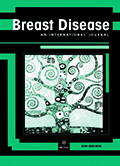Authors: Gilbert, Samuel F. | Soliman, Amr S. | Karkouri, Mehdi | Quinlan-Davidson, Meaghen | Strahley, Ashley | Eissa, Mohab | Dey, Subhojit | Hablas, Ahmed | Seifeldin, Ibrahim A. | Ramadan, Mohamed | Benjaafar, Noureddine | Toy, Kathy | Merajver, Sofia D.
Article Type:
Research Article
Abstract:
Introduction: Male breast cancer (MBC) is a rare disease. Rates of MBC in Northern Africa vary by region. The age-standardized incidence for MBC is higher in Morocco than in Egypt, and the Egyptian rate is similar to the U.S of approximately 1/105 . This study aimed at investigating the clinical and molecular characteristics of MBC in Egypt and Morocco. Methods: This case-case study included 211 cases from Egypt and 132 from Morocco. Tumor tissues were available for 47 Egyptian and 18 Moroccan patients. Medical record information was abstracted for patients’ demographics, medical history, and treatment. BRCA2 protein expression
…status was examined in Egyptian and Moroccan tumors. Androgen receptor CAG repeat length was analyzed using the tissue samples in Egyptian MBC tumors and controls. Limited amount of tissues from Morocco did not allow for the analysis of CAG repeats. Results: Egyptian MBC patients had a significantly lower age at diagnosis (Egypt: 57.5 ± 15.1 , Morocco: 63.9 ± 14.4 , P = 0.0002 ) and a higher prevalence of liver cirrhosis (Egypt: 28.0%, Morocco: 0.8%, P = < 0.0001 ). MBC patients also had higher tumor grades [I (0.9%), II (81.0%), III (18.1%)] in Egypt vs. [I (10.7%), II (81.0%), III (8.3%)] in Morocco (P = 0.0017 ). The clinical and molecular characteristics of the groups from the 2 countries did not significantly differ. There was no significant difference with respect to BRCA2 expression amongst countries (Egypt: 28.9% non-wild type, Morocco: 27.8% non-wild type, P = 0.9297 ) or CAG lengths amongst BRCA2 expression types in Egyptians (Wild type: 54.6% with CAG repeat lengths of 20+, Non-wild type: 50% with CAG repeat lengths of 20+, P = 0.7947 ). Conclusions: Differences in MBC between Egypt and Morocco are more likely due to differences in other risk factors such as consanguinity and use of xenoestrogenic pesticides.
Show more
Keywords: Male breast cancer, breast cancer, Egypt, Morocco, developing countries
DOI: 10.3233/BD-2010-0323
Citation: Breast Disease,
vol. 33, no. 1, pp. 17-26, 2012
Price: EUR 27.50





